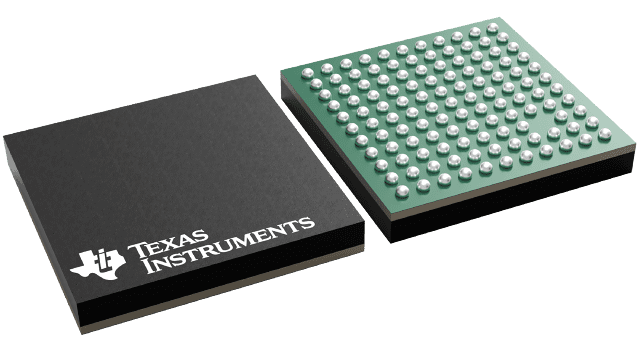パッケージ情報
| パッケージ | ピン数 NFBGA (ZBH) | 120 |
| 動作温度範囲 (℃) -40 to 85 |
| パッケージ数量 | キャリア 2,500 | LARGE T&R |
TWL6040 の特徴
- Four Audio Digital-to-Analog Converter (DAC) Channels
- Stereo Capless Headphone
Drivers:
- Up to 104-dB DR
- Power Tune for Performance and Power Consumption Tradeoff
- Stereo 8 Ω, 1.5 W per Channel Speaker Drivers
- Differential Earpiece Driver
- Stereo Line-Out
- Two Audio Analog-to-Digital Converter (ADC)
Channels:
- 96-dBA SNR
- Four
Audio Inputs:
- Three Differential Microphone Inputs
- Stereo Line-In and FM Input
- Two Vibrator and Haptics Feedback
Channels:
- Differential H-Bridge Drivers
- Two Low-Noise Analog Microphone Bias Outputs
- Two Digital Microphone Bias Outputs
- Analog Low-Power Loop from Line-in to Headphone and Speaker Outputs
- Dual Phase-Locked Loops (PLLs) for Flexible Clock
Support:
- 32-kHz Sleep Clock Input for System Low-Power Playback Mode
- 12-, 19.2-, 26-, and 38.4-MHz System Clock Input
- Accessory Plug and Unplug Detection, Accessory Button Press Detection
- Integrated Power
Supplies:
- Negative Charge Pump for Capless Headphone Driver
- Two Low Dropout Voltage Regulators (LDOs) for High Power Supply Rejection Ratio (PSRR)
- I2C Control
- Thermal Protection:
- Host Interrupt
- Power
Supplies:
- Analog: 2.1 V
- Digital I/O: 1.8 V
- Battery: 2.3 to 5.5 V
- Package 6-mm × 6-mm 120-Pin PBGA
TWL6040 に関する概要
The TWL6040 device is an audio coder/decoder (codec) with a high level of integration providing analog audio codec functions for portable applications, as shown in . The device contains multiple audio analog inputs and outputs, as well as microphone biases and accessory detection. The device is connected to the OMAP 4 host processor through a proprietary PDM interface for audio data communication enabling partitioning with optimized power consumption and performance. Multichannel audio data is multiplexed to a single wire for downlink (PDML) and uplink (PDMUL).
The OMAP4 device provides the TWL6040 device with five PDM audio-input channels (DL0–DL4). Channels DL0–DL3 are connected to four parallel DAC channels multiplexed to stereo headphone (HSL, HSR), stereo speaker (HFL, HFR), and earpiece (EAR) or stereo line outputs (AUXL, AUXR).
The stereo headphone path has a low-power (LP) mode operating from a 32-kHz sleep clock to enable more than 100 hours of MP3 playback time. Very-high dynamic range of 104 dBA is achieved when using the system clock input and DAC path high-performance (HP) mode. Class-AB headphone drivers provide a 1-Vrms capability output and are ground centered for capless connection to a headphone, thus enabling system size and cost reduction. The earpiece driver is a differential class-AB driver with 2 Vrms capability to a typical 32-Ω load or 1.4 Vrms to a typical 16-Ω load.
Stereo speaker path has filterless class-D outputs with 1.5-W capability per channel. Output power maximization supply connections to an external boost is supported. Speaker drivers also support hearing aid coil loads. For vibrator and haptic feedback support, the TWL6040 has two PWM channels with independent input signals from DL4 or inter-integrated circuit (I2C).
Vibrator drivers are differential H-bridge outputs, enabling fast acceleration and deceleration of vibrator motor. An external driver for a hearing aid coil or a piezo speaker requiring high voltage can be connected to line outputs.
The TWL6040 supports three differential microphone inputs (MMIC, HMIC, and SMIC) and a stereo line-input (AFML, AFMR) multiplexed to two parallel ADCs. The PDM output from the ADCs is transmitted to the OMAP4 processor through UL0 and UL1. AFML, AFMR inputs can also be looped to analog outputs (LB0, LB1).
Two LDOs provide a voltage of 2.1 V to bias analog microphones (MBIAS and HBIAS). The maximum output current is 2 mA for each analog bias, allowing up to two microphones on one bias. Two LDOs provide a voltage of 1.8 V/1.85 V to bias digital microphones (DBIAS1 and DBIAS2). One bias generator can bias several digital microphones at the same time, with a total maximum output current of 10 mA.
The TWL6040 has an integrated negative charge pump (NCP) and two LDOs (HS LDO and LS LDO) for high PSRR. The only external supply needed is 2.1 V, which is available from the 2.1-V DC-DC of the TWL6030 power-management IC (PMIC) in the OMAP4 system. By powering audio from low-noise 2.1-V DC-DC of low power consumption, high dynamic range and high output swing at headset output are achieved. All other supply inputs can be directly connected to battery or system 1.8-V I/O.
Two integrated PLLs enable operation from a 12-, 19.2-, 26-, and 38.4-MHz system clock (MCLK) or, in LP playback mode, from a 32-kHz sleep clock (CLK32K). The frequency plan is based on a 48-kS/s audio data rate for all channels, and host processor uses sample-rate converters to interface with different sample rates (for example, 44.1 kHz). In the specific case of low-power audio playback, the TWL6040 supports the 44.1-kS/s and 48-kS/s rates. Transitions between sample rates or input clocks are seamless.
Accessory plug and unplug detections are supported (PLUGDET). Some headsets have a manual switch for submitting send/end signal to the terminal through the microphone input pin. This feature is supported by a periodic accessory button press detection to minimize current consumption in sleep mode. Detection cycle properties can be programmed according to system requirements.
